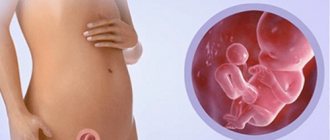Stomach pain during pregnancy: normal or pathological
From 1 to 12 weeks of pregnancy, a number of serious changes occur in the mother’s body.
Typically, pain in the abdomen appears due to physiological factors that do not pose a danger to the woman and the fetus.
Typical causes of abdominal pain in a pregnant woman, considered normal:
- Unstable functioning of the stomach and intestines. In this case, in the early stages of the perinatal period, digestive dysfunction occurs - difficulty or absence of bowel movements, flatulence and bloating.
- The hormones produced during pregnancy are progesterone. This component softens joints and ligaments, promotes the slow formation of the birth canal and prepares the female body for the birth process. The uterine ligaments become more elastic and stretch, which causes characteristic pain.
- Growth and elevation of the uterus in the peritoneum. By the end of the 1st trimester - at 10-12 weeks, the uterus changes its size and rises from the pelvis to the abdominal region. At this time, abdominal pain can be caused by stretching of the muscle tissue of the organ and its enlargement.
These changes are not considered dangerous, their duration is short, but doctors advise reporting them to a gynecologist.
Only a certain type of pain can signal that there are no threats to the course of pregnancy. If the pain is not sharp or acute, but aching in nature, this may indicate the implantation of the embryo into the uterine wall and the attachment of the fertilized egg. This condition may be accompanied by pinkish discharge and implantation bleeding.
Obstetric causes of dysfunction
The most unpleasant thing that can become the basis for the occurrence of colic is the causes of an obstetric nature, that is, deviations that can harm the fetus, or even cause premature termination of pregnancy.
Sometimes the problem lies in the nature of the pregnancy: it may be ectopic. That is, after fertilization, the egg is not fixed in its proper place on the wall of the uterus, but in the fallopian tube, in the ovary or in another place not intended by nature.
Placental abruption, pathology of the structure of the cervix or its injury, an infectious disease in this area can also cause stabbing pain.
The uterus may find itself in a state of hypertonicity, which is also painful, and most importantly, can cause the threat of miscarriage. In such a situation, you cannot do without medical supervision, otherwise you may lose the child. Only a doctor will assess the scale of the problem and prescribe appropriate treatment, possibly within the walls of a hospital.
The main thing is not to miss alarming symptoms, to cut off the possibility of a threatened miscarriage, and only a doctor can do this.
The nature of the physiological manifestations of stomach pain during pregnancy
Pain in the stomach should not be confused with pain in the intestines or other organs of the peritoneum. It can have a different character and strength, it all depends on the reason. The intensity of the discomfort depends on the woman’s pain threshold. Usually they are aching, sharp, cramping, but short-lived.
Heaviness after eating in the early stages
In the 1st trimester, after eating, painful cramps in the lower abdomen are possible. They arise as a result of physiological processes when a full intestine puts pressure on the growing uterus. Discomfort occurs approximately 15-30 minutes after a meal. This condition does not require treatment.
Pain after medicine
Sometimes discomfort in the stomach occurs after taking any medicine. The condition is often characterized by nausea, vomiting, or upset bowel movements. The body begins to reject the drug due to changes in it. As a way out, it is recommended to stop the medication and cleanse the stomach, drink sorbents such as activated carbon or Polysorb.
Bloating and nausea
The stomach swells and nausea occurs, usually due to poisoning. This phenomenon can be stopped with sorbent drugs, and sometimes approved antispasmodics are used. To eliminate nausea, antiemetic medications are used.
In the early stages
When pregnancy occurs, the female body begins the process of restructuring and adaptation. The changes that are taking place certainly affect the gastrointestinal tract as well. A woman may encounter a list of new conditions and sensations previously unknown to her, namely: • bloating, increased gas formation, accumulation of gases; • bowel dysfunction; • decreased tone of the alimentary valve (sphincter), which makes it difficult for food to pass through; • pressure from the growing uterus on the internal organs, spraining the ligaments, leading to pain radiating to the stomach; • heartburn, nausea; • increased fatigue due to physical activity.
The nature of pathological pain sensations
Pathological conditions are accompanied by pain, the intensity of which depends on the underlying cause.
- In the case of gastritis, complicated pancreatitis or colitis, there is a sharp and severe pain that lasts a long time. The character is cramping, sharp, like an ulcer. The patient may even feel a dagger-like pain.
- Physical overload or psychological stress. These factors cause severe pain. The discomfort goes away on its own after 1-2 days.
- With food poisoning, a woman, in addition to pain, suffers from nausea, vomiting, diarrhea, and weakness in the body. The nature of painful spasms is aching or acute, depending on the severity of poisoning by toxins - waste products of pathogenic agents.
It is necessary to consult a doctor, since there is a risk of worsening the mother’s condition due to the progression of the disease.
Acute and sharp pain in the left side in the later stages
In the 2nd trimester, the fetus grows rapidly. The baby becomes cramped in the uterus, he moves with low intensity, but the force of the turns increases, and sometimes significantly. For the mother, these movements can be painful, especially if the bladder is full. Such discomfort is not dangerous and is considered a natural process.
If noticeable pain occurs, you can change position. You should also relax, take a couple of deep breaths, stroke your belly and talk to the baby - ask him to calm down.
Severe stomach pain with cramps
The uterus is held between the iliac bones by connective ligaments.
During pregnancy, her weight increases and the ligaments become more strained. Due to this, women feel pain. Discomfort is usually localized in the lower part of the stomach, inguinal folds and the area above the pubis.
Severe painful spasms can also occur due to a sudden change in body position:
- during fast turns;
- when getting up;
- when lifting weights;
- during coughing and sneezing.
The mother feels a sharp pain, which quickly passes without taking therapeutic measures. Painful sensations of this origin occur at any stage of pregnancy and may disappear towards the end.
Cramps after eating
During gestation, specific hormones are produced that affect the intestines. Food is digested more slowly, and individual parts may become stretched, causing constipation. A woman experiences dull, bursting pain in the lower abdomen, usually in the left side. There is also increased formation of gases. As food is digested, the pain disappears, but may reappear if you eat the wrong foods.
A pregnant woman should drink plenty of fluids, eat fermented milk products, raw vegetables, fruits and bran bread. To prevent constipation, moderate physical activity is recommended.
What to do?
“Gastrofarm” will help soften the inflammatory process of the stomach walls.
The pain in the stomach is becoming more and more frequent; the question of treatment has become urgent? Remember where to start and what to do. First you need to find out the cause of the unpleasant situation. Check what causes colic: fruit acid, eating at night, long intervals between meals. Reliable information will help establish a diagnosis and choose a safe treatment method. Treating the stomach during pregnancy is a complex, lengthy process that requires special attention. The main task is to establish a balanced, proper diet. The expectant mother's diet should not include salty, spicy, or fatty foods. In the first months, try to eat a piece of bread or banana without getting out of bed:
- “Gastrofarm” will help soften the inflammatory process of the stomach walls. The drug is safe for both mother and baby. Widely used during toxicosis and during breastfeeding.
- “No-Shpa” will help relieve spasms. The results of the study proved the safety of the drug. Spasms are dangerous for the baby, so No-Shpy tablets should always be at hand for the expectant mother.
- “Cerucal” helps a woman’s body cope with toxins, harmful substances that are formed during fetal development. It is safe, improves stomach function, and removes formed toxins.
But problems can be much more serious. It is not recommended for expectant mothers to perform operations or take medications, since maintaining the baby’s health is one of the main tasks of the “pregnant-bellied” period. Decisive measures in the treatment of the disease are postponed until after childbirth, but in the meantime, it is not chemical medicine that will help eliminate colic, but herbal preparations. They should be taken as prescribed by a doctor and in small dosages.
Treatment of pain during pregnancy
Therapy is complicated by limitations in the ability to prescribe medications.
Prescribe any drugs with caution, taking into account the duration of pregnancy. The main task is to eliminate the cause. If the pain is severe, the use of medications is allowed. For mild discomfort, it is advisable to treat it with diet therapy, therapeutic exercises, increased drinking and massages. What pharmaceutical products can be used for abdominal pain in pregnant women?
- In the 1st trimester, taking pharmaceutical drugs is most dangerous. Severe pain is relieved with No-shpa, tincture of valerian and motherwort. You can also use Rennie, Gaviscon, Trimedat. Severe spasms are eliminated with the help of Papaverine hydrochloride or Cerucal.
- In phase 2 there are already fewer restrictions. Physical therapy, walks in the fresh air, drinking mineral water like Essentuka and a special diet are widely recommended. If a woman suffers from constipation, glycerin rectal suppositories can be used.
- In the 3rd trimester, it is advisable to use unconventional methods. Among pharmaceutical products you can use Smecta, Motilium and Essentiale. Their folk recipes highlight a tincture of birch buds.
Among the products recommended are dried apricots and prunes. These fruits will not only boost your immunity, but also improve your digestive function.
Which doctor should I contact?
If you have abdominal pain, you should make an appointment with a gynecologist or gastroenterologist. If we are talking about a severe attack, they call an ambulance and the therapist refers to more specialized specialists.
Is it possible to treat at home?
You can fight stomach pain at home, but only after consulting a doctor. The following means are widely used.
- Fresh potato juice.
- Flaxseed tincture.
- Tea with lemon balm and mint.
If pain is accompanied by nausea, apples and bananas help. In case of inflammatory reactions, drink milk with honey.
Is it possible to take pills to improve digestion?
A lack of enzymes can manifest itself as a violation of digestive function, causing bloating and heaviness in the abdomen. Doctors allow the following enzyme medications to be taken:
- Festal;
- Pepsin;
- Mezim;
- Pancreatin.
It is better to wash down these remedies with mineral water, for example Narzan. Then the enzymes will work fully.
Folk remedies
In an interesting situation, it is better to carry out treatment using traditional methods, since the use of chemicals is undesirable. There are many traditional methods for treatment during pregnancy.
What to do if your stomach hurts? The following folk methods will help you with gastritis:
- If a woman has gastritis with high or normal acidity, it can be treated with herbs (St. John's wort, yarrow, chamomile). Pour hot water over the collection and leave for 2-3 hours. Take twice daily (morning and evening) before meals.
- If a woman has gastritis due to low acidity, treat it by collecting herbs from dill, thyme, oregano, wormwood, and caraway.
- Honey helps a lot with gastritis.
- Severe pain will be relieved by ordinary mineral waters. Maintain bed rest.
Conditions that threaten the life of mother and child
Situations when you should call an ambulance are highlighted. These include:
- ectopic pregnancy - characterized by severe pain radiating to the leg and anus;
- premature placental abruption – accompanied by bleeding and cramping pain, severe and prolonged;
- premature birth - starting from 22-37 weeks, is caused by discomfort in the lower back and lower abdomen of a cramping type.
Stomach pain requires seeing a doctor in any case. A woman cannot always independently determine the degree of danger of a phenomenon. Sometimes discomfort is a signal of a serious illness that worsens during pregnancy.
Why pain may occur
Stomach pain during pregnancy occurs in the first trimester and later. The constantly growing uterus not only occupies all the free space of the abdomen, but also forces other internal organs to share their space. And the “extreme” among all these organs may be the stomach.
Pain during pregnancy is common. During this period, a woman experiences many changes, both pleasant and not so pleasant.
Pain can be of three types:
- Medication. Various diseases, infections, etc.
- Mechanical. Bruises, fractures, heavy lifting, fetal blows.
- Poisoning of various kinds (food) or allergies.











